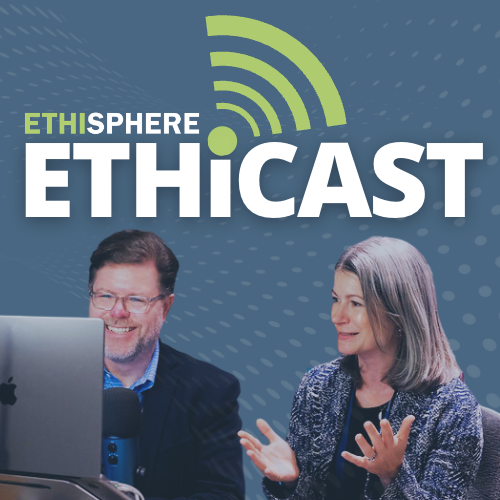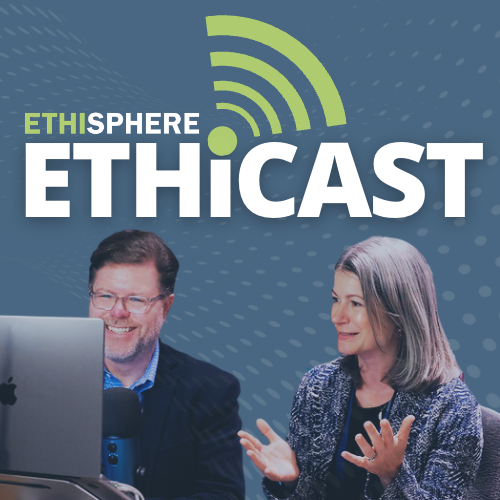[00:00:00] Speaker A: Hi everyone. You've got questions and we've got answers. Welcome to another Bella Asks episode of the Ethicast.
The Business Ethics Leadership alliance, or bela, is a global ethics and compliance community that provides exclusive access to helpful data, benchmarking events and and other resources to advance your ethics and compliance program. And with bella's concierge service, members can submit any question regarding ethics and compliance and our internal experts will provide an answer, plus helpful resources with more information. And while we invite everyone watching and listening to join bella, we also know that there's no competition in compliance. And that's why we're using this program to thematically respond to high level questions from the Bella community for the benefit of ENC teams every everywhere. And joining us once again to answer those questions is Bella chair Erica Salmon Byrne. Erica, thank you so much for returning to the program.
[00:00:59] Speaker B: Oh, Bill, it is my pleasure and I am delighted that this particular question came up because it has been something that has been very much on my mind lately.
[00:01:07] Speaker A: It is a benchmarking question and it's a fantastic one. What does a good post benchmarking action plan look like?
[00:01:15] Speaker B: Yeah. So there are so many among us, Bill, who would believe that you pull the benchmarking data, it shows that you are behind or seriously behind your peers in a given area, and you march with those data charts into the management team's office and they say, bill, how shall we fix this? What do we do? Right.
[00:01:39] Speaker A: The clouds have parted. You, you've shown us the light.
[00:01:42] Speaker B: Yes, I have. I. You have seen the Gantt chart and that is all that is required. Right.
And of course that's not really the case. Right. There's, there's so much. The data is going to give you pieces of what it is you're looking for in terms of making the case, but the data is not going to give you all of the answers, as pretty as your charts might be. Right. You've got this, you know, beautiful heat map with all the colors and all the things, right? So really what you need to do is you need to see the benchmarking data side of things, the scoring, the question by question benchmarking, the, you know, the, the gap analysis. You need to see that as the first step in the journey. And the next thing that you need to do is you need to say, what is this data telling me? Right. What is this benchmarking telling me? So let's say, hypothetically speaking, that you have done a benchmarking exercise and you have realized that your efforts at training completion rates are significantly behind your peers. Right. You don't have a completion incentive in the sense of a punitive exercise like, I get my systems shut off. There's nothing that forces people to complete training. And so your ethics and compliance team spends inordinate amounts of time chasing people, trying to get them to complete their training.
If you find yourself in that situation, you might be tempted to go to, you know, pull out a benchmarking piece of information and say, look, 90% of our peers shut off people's access if they don't complete their training.
And that might be true, but does that mean that they have a single system that allows them to shut people off? Probably. Maybe you don't. Right. Maybe you don't have a management team that is willing to take that kind of a punitive exercise. And so instead, what you need to do is you need to ask yourself, okay, what are the other levers I can pull here?
Have I devoted. Have I designed training that people don't mind taking?
That's always my first question anytime you wind up in a situation like this is, is my training something where I have to threaten to turn off your. Your systems access because you're dreading taking my training so much? Well, maybe I should address that problem first before, you know, before I. I chase this. So really looking at the data as just the first step in the process. Right? It is the. The data. The benchmarking piece is going to give you a sense of the places where you are far, farthest off the practices of your peers. And that should be the starting point, not the ending point of the conversation. Then you have to ask yourself, okay, what is this data telling me? What is this data telling me I should try to change? What do I need to make that change possible in the first place? And then you take that data chart and you march into your leadership team's office and you say, this is what the data tells me. This is why I think this matters to us as an organization. This is what I would like to do about it, and this is what I need from you.
[00:04:40] Speaker A: Well, Erica, as always, we super appreciate your insight on these really important questions from the Bella community. Thank you so much for spending your time with us.
[00:04:47] Speaker B: Oh, absolutely, Bill. And by the way, I did have a Bella member comment to me the other day about the fact that our Bella asks episodes are just about the exact amount of time that they would like them to be. Not a second more and not a demisecond longer.
[00:05:05] Speaker A: Perfect. Perfect. Well, then I won't say anything more. Thank you so much for joining us.
[00:05:09] Speaker B: My pleasure and all those Bella members out there listening. Remember, keep the questions coming so I get to come back and talk to my friend Bill.
[00:05:14] Speaker A: To learn more about Bella, visit ethisphere.com bella to request guest access to the Member Resource Hub and to speak with the BELLA Engagement Director. If you have a question that you would like answered on this program, contact the Bella Concierge Service and we'll get to work on it for you. I'm Bill Coffin and this has been another Bella Asks episode of the Epicast. If this is your first time listening, we hope you've enjoyed the show. For more content like this every week, please subscribe to this program on YouTube, Apple Podcasts or Spotify. You can also check out full episodes of this show as well as many other free resources at the Ethisphere resource
[email protected] resources thank you so much for joining us. And until next time, remember, strong ethics is good business.


